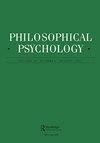哲学与科学之间的规范性
IF 1.4
3区 哲学
Q2 ETHICS
引用次数: 1
摘要
ABSTRACT 近几十年来,"规范性 "一词的使用呈上升趋势,不仅在哲学讨论中使用,而且在实证科学家的报告中也越来越多地使用。这可能会引发一个问题:这些发展在多大程度上相互重叠,又在多大程度上相互超越。如果有明显的重叠,可能会导致两种规范研究方法的有趣结合,这可能会使一些关于规范性的哲学推测 "自然化",使它们有一个更坚实的基础,同时为实证科学家提供一些指导其研究的新动力。在本文中,我概述了最近关于人类规范性的一些经验性结果,并指出了某种哲学传统,尤其是植根于维特根斯坦、塞拉斯和布兰登姆著作中的哲学传统,这种传统对待规范性的方式使规范性或多或少地与这些结果相一致。本文章由计算机程序翻译,如有差异,请以英文原文为准。
Normativity between philosophy and science
ABSTRACT Recent decades are marked by the upswing of the use of the term “normativity“ not only in philosophical discussions, but increasingly also within reports of empirical scientists. This may invoke the question how far these developments overlap and in how far they go past each other. A significant overlap might lead to an interesting coalescence of the two approaches to norms, which may provide for a ”naturalization” of some philosophical speculations about normativity, putting them on a firmer foundation, while offering the empirical scientists some new impulses for directing their research. In this paper I give an overview of some recent empirical results concerning human normativity and I point out a certain philosophical tradition, rooted especially in the works of Wittgenstein, Sellars and Brandom, which treats normativity so that it becomes more or less compatible with these results.
求助全文
通过发布文献求助,成功后即可免费获取论文全文。
去求助
来源期刊

Philosophical Psychology
Multiple-
CiteScore
2.40
自引率
14.30%
发文量
120
期刊介绍:
Philosophical Psychology is an international journal devoted to developing and strengthening the links between philosophy and the psychological sciences, both as basic sciences and as employed in applied settings, by publishing original, peer-refereed contributions to this expanding field of study and research. Published articles deal with issues that arise in the cognitive and brain sciences, and in areas of applied psychology.
 求助内容:
求助内容: 应助结果提醒方式:
应助结果提醒方式:


